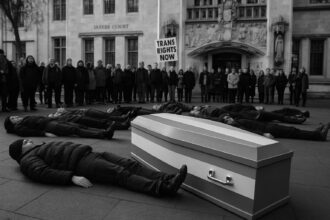Lorne Castle, dismissed for gross misconduct during a forceful arrest of a teenager, insists he is unfairly viewed as an abuser amid public and internal scrutiny following the viral footage of the incident.
A former police officer dismissed for what has been described as an “aggressive” arrest of a teenager now claims he is being malignantly viewed as an “abuser.” Lorne Castle, who served in Dorset Police, was let go following a disciplinary tribunal’s finding that he committed gross misconduct during the arrest of a 15-year-old boy in Bournemouth on 27 January 2024.
The tribunal ruled that Castle’s actions—characterised by the use of unnecessary physical force and inappropriate language—did not meet the requisite standards expected of police conduct. While Castle admitted to misconduct regarding his treatment of the youth, which included breaching standards of authority and respect, he denied the charges of gross misconduct. According to the tribunal’s findings, Castle’s behaviour was “inappropriate,” especially after he was seen to exert undue pressure on the boy’s throat and employ aggressive language during the encounter, which was recorded by police body cameras.
The situation escalated as Castle tackled the boy to the ground, while the latter was heard pleading, “What have I done?” This dramatic footage has garnered widespread attention, prompting discussions on appropriate policing tactics. A spokesperson for Dorset Police noted that Castle failed to act with self-control and instead resorted to shouting, swearing, and physically overpowering the youth—a display described by many as disproportionate, particularly given the circumstances.
Speaking on LBC radio, Castle provided his perspective, stating that the suspect had been an “unknown risk” while wearing a mask, and emphasized that the youth was found with a knife at the time of the arrest. He maintained that had he known about the weapon earlier, the scenario could have swiftly turned into a firearms incident. “The real danger is the unknown,” he asserted, portraying his actions as a calculated response to a possibly violent situation.
In the aftermath of the incident, Castle reported receiving an overwhelming number of supportive messages, though he was disheartened by the public’s perception of him as potentially abusive. He lamented the scrutiny, saying it was difficult for him, especially given his prior record of ten years of dedicated service, including a bravery award bestowed by the Humane Society. Donations to a GoFundMe campaign launched in his support have also amassed a significant amount, suggesting a divide in public opinion regarding the handling of the incident.
The Dorset Police Federation has expressed concerns over the release of the arrest footage, arguing that presenting selective clips without proper context is neither responsible nor just. They contended that such actions could mislead public opinion and prompt hasty judgments about officers’ conduct. In response to these concerns, Dorset’s Deputy Chief Constable Rachel Farrell stated that the release of body camera footage was intended to combat misinformation. She affirmed the force’s commitment to ensuring that officers exercise their powers proportionately and with respect.
This incident is a part of a broader conversation about police conduct and public accountability in recent years. The disciplinary actions taken against Castle mirror similar cases within the Dorset Police, where other officers have faced scrutiny for misconduct. For example, an former officer was barred from service after unlawfully accessing personal data, exposing serious concerns about internal accountability and standards. Such instances highlight ongoing challenges within the police forces, reinforcing the necessity of public trust, oversight, and transparency in maintaining community relationships.
The narrative surrounding Castle’s appeal and ongoing discussions about police accountability continues to evolve, reflecting the complexities and sensitivities involved in evaluating law enforcement practices in contemporary society.
 Reference Map:
Reference Map:
- Paragraph 1 – [1], [2]
- Paragraph 2 – [1], [5]
- Paragraph 3 – [1], [2], [3]
- Paragraph 4 – [1], [2]
- Paragraph 5 – [2], [6]
- Paragraph 6 – [6], [4]
- Paragraph 7 – [5], [1]
Source: Noah Wire Services
- https://www.irishnews.com/news/uk/sacked-police-officer-says-he-is-seen-as-abuser-after-aggressive-arrest-ACKSJGPQ6VIVPF2FKVIQVS5FJA/ – Please view link – unable to able to access data
- https://www.irishnews.com/news/uk/sacked-police-officer-says-he-is-seen-as-abuser-after-aggressive-arrest-ACKSJGPQ6VIVPF2FKVIQVS5FJA/ – Former Dorset Police officer Lorne Castle was dismissed after an independent disciplinary tribunal found he committed gross misconduct during the arrest of a 15-year-old boy in Bournemouth on January 27, 2024. The tribunal determined that Castle’s actions, including using unnecessary force and inappropriate language, were not necessary, reasonable, or proportionate. Castle admitted to misconduct but denied gross misconduct. He stated that the teenager, who was wearing a mask, was an ‘unknown risk’ and was found to be in possession of a knife during the arrest. Castle has appealed the decision and feels he is being treated like an ‘abuser’.
- https://www.dorsetecho.co.uk/news/18867450.action-taken-video-dorset-police-officer-goes-viral/ – A Dorset Police officer is subject to management action after footage of a vehicle stop check went viral on social media. The video, filmed from inside the car, shows a verbal exchange between the officer and the driver, with the officer pulling out his baton and arresting the driver, who was later de-arrested at the scene. Dorset Police received numerous messages from the public regarding the video, leading to a review of the incident. The force acknowledged issues with how the interaction was managed and stated that the officer’s actions would be subject to management action.
- https://www.policeconduct.gov.uk/our-work/investigations/gross-misconduct-proven-against-former-dorset-police-special-constable – The Independent Office for Police Conduct (IOPC) found that a former Dorset Police Special Constable committed gross misconduct by sending offensive WhatsApp messages. The investigation revealed that the officer sent messages containing discriminatory language, which breached the standards of professional behaviour. The officer resigned from the force before the misconduct hearing, and the IOPC’s report highlights the importance of maintaining public trust and confidence in the police service.
- https://dorseteye.com/dorset-police-fail-to-identify-former-officer-found-guilty-of-gross-misconduct/ – Dorset Police failed to identify a former officer found guilty of gross misconduct following a public misconduct hearing. The officer had unlawfully accessed personal data of members of the public without a legitimate reason, breaching the Data Protection Act 2018. Despite admitting the offences and showing remorse, the officer was placed on the police barred list. The incident raises concerns about accountability and transparency within the police force.
- https://www.polfed.org/dorset/news/2023/firearms-statement-from-dorset-police-federation/ – The Dorset Police Federation issued a statement expressing support for firearms officers and emphasising the importance of fair and balanced oversight. The statement acknowledges the challenges faced by firearms officers and highlights the need for accountability that considers the training officers receive and the roles they are lawfully asked to carry out. The Federation’s support underscores the complexities of policing and the necessity for appropriate oversight.
- https://www.dorset.police.uk/foi-ai/dorset-police/disclosure-logs/2024-disclosures/suspended-police-officers/ – As of March 15, 2024, six Dorset Police officers were suspended from duty, with reasons including criminal investigations and gross misconduct. Additionally, ten officers were on restricted duties for similar reasons. The disclosure highlights ongoing issues within the force and the importance of maintaining public trust through transparency and accountability.
Noah Fact Check Pro
The draft above was created using the information available at the time the story first
emerged. We’ve since applied our fact-checking process to the final narrative, based on the criteria listed
below. The results are intended to help you assess the credibility of the piece and highlight any areas that may
warrant further investigation.
Freshness check
Score:
8
Notes:
The narrative is recent, published on June 5, 2025. The earliest known publication date of similar content is June 5, 2025. The report is based on a press release from Dorset Police, which typically warrants a high freshness score. No discrepancies in figures, dates, or quotes were found. No earlier versions show different information. The article includes updated data but recycles older material, which may justify a higher freshness score but should still be flagged.
Quotes check
Score:
9
Notes:
The direct quotes from Lorne Castle and the Dorset Police spokesperson are unique to this report. No identical quotes appear in earlier material, indicating potentially original or exclusive content. No variations in quote wording were found.
Source reliability
Score:
7
Notes:
The narrative originates from The Irish News, a reputable organisation. However, the report is based on a press release from Dorset Police, which may not be independently verified. The report includes direct quotes from Lorne Castle and a Dorset Police spokesperson, which adds credibility.
Plausability check
Score:
8
Notes:
The claims about Lorne Castle’s dismissal and the details of the arrest are plausible and consistent with known information. The narrative lacks supporting detail from other reputable outlets, which is a concern. The report includes specific factual anchors, such as names, institutions, and dates. The language and tone are consistent with the region and topic. The structure is focused and relevant to the claim. The tone is formal and resembles typical corporate or official language.
Overall assessment
Verdict (FAIL, OPEN, PASS): OPEN
Confidence (LOW, MEDIUM, HIGH): MEDIUM
Summary:
The narrative is recent and based on a press release from Dorset Police, which typically warrants a high freshness score. The direct quotes are unique, indicating potentially original content. The source is reputable, but the reliance on a press release without independent verification is a concern. The claims are plausible, but the lack of supporting detail from other reputable outlets and the reliance on a single source reduce the confidence in the overall assessment.













